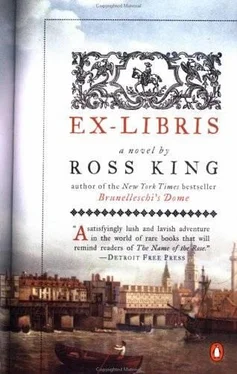'Gondomar,' I murmured.
'Precisely. Everyone knew how King James was under his influence. Gondomar ruled over him even more than did Buckingham-plain Sir George Villiers he was in those days, of course. And Gondomar was said to be most unhappy with Raleigh's charter. You see, he considered Raleigh nothing more than a privateer, like Drake. And soon there were rumours that Villiers was no longer so enthusiastic about the venture either. So it was that for eight months we expected to see Pett's carpenters throw down their tools, or else to wake up one morning to find that the Sidney had burnt to cinders on her keel blocks.'
A wind was stirring through the window, bringing with it a stink of brackish tide. I watched a herring-gull swoop past the raised sash, then a rocking mast from a pinnace tacking slowly upstream. Biddulph had fallen silent and the hammers in the timber-yard seemed louder than ever.
'But neither of those things happened,' I prompted him. 'The ship sailed.'
'Indeed she did.' Biddulph shifted the bulge of tobacco to the other cheek and shrugged. 'Greed prevailed over both fear and common sense, as it usually does. The money for fitting out the ship and paying her crew had already been raised through investors in the Royal Exchange, so fear and common sense would have made bankrupts of half of London. Ergo, in June of the year 1617 the Sidney sailed from London to join the rest of the fleet at Plymouth. I watched that too. I saw her cast off her anchors and ride down the Thames from Woolwich. I can still see the name painted in gilt on her escutcheon,' he said reflectively, then added: 'Peculiar name for a ship, is it not? That of a poet.'
'Yes,' I replied. 'Peculiar indeed.' It had already occurred to me that there might be a connection between the ship and one of the books of Hermetic philosophy I had dusted off a few days earlier, Giordano Bruno's Spaccio della bestia trionfante , an esoteric work that glorifies the religion of the ancient Egyptians. Bruno had dedicated his treatise to Sir Philip Sidney, who was not only a poet and courtier, but also a soldier who had died while fighting the Spaniards in the Low Countries.
'As I say, I watched her sail away on her maiden voyage,' Biddulph was continuing. 'But I knew it would be the last time I'd see her. I knew even then that the Sidney would never return to London.'
'Because of Gondomar?' I thought I knew this part of the story. As Raleigh left Plymouth a fleet of Spanish warships was rumoured to be setting sail from La Coruña. 'There were stories that the Spaniards aimed to intercept the fleet.'
'No, there was more than that.' He shifted about in his little chair, from which horsehair stuffing was burgeoning. 'At that time I was in a position to see the contract-books for the ship. I read everything to do not only with the fitting out and provisioning of the Sidney , but with the other ships as well. In those days I was responsible for preparing all contracts and letters to and from the Navy for signature and despatch. These documents had to do mainly with the purchase of stores and timber, with cordage and sails and so forth. A fleet of ships is like a herd of great ravening beasts, you understand. They have to be watered and provisioned, then scrubbed and groomed like prize racehorses and afterwards fitted out in canvas like fine ladies at their milliner's or dressmaker's. I also looked after all of the plans and models made by the shipwrights,' he finished, 'along with the contracts for their services.'
'And what was it that you learned from the contracts for the Philip Sidney? '
His face remained expressionless. 'I learned that her captain had no intention of voyaging up the waters of the Orinoco. You see, Mr. Inchbold, Captain Plessington's ship was different from the others in the fleet.'
I felt myself swallow. The rumbullion and the noise of the hammers were giving me a terrible headache. 'Different in what way?'
'The Sidney was a first-rate,' he explained. 'That meant she could carry a hundred guns or more. The Destiny was fitted with only thirty-six. So with such heavy cannon the Sidney needed a deep keel, of course, like most of our first-rates. That's why our warships are superior to those of the Dutch,' he added in a lower tone, as if fearful that a Dutch spy might be loitering beneath his crumbling eaves. 'That's why Cromwell was able to defeat the Dutch so soundly in '54. Their warships need shallow draughts so they can navigate their own coastal waters, and because they need shallow draughts they can't carry the same heavy cannon that we can. Ergo, we have much more firepower. With a couple of 32-pounders one of our first-rates can scatter their fleets like chaff. The Spaniards and their frigates, however… well, that's another matter entirely,' he added ruefully.
'But the Philip Sidney ,' I prompted him again: 'her keel was deep?'
'Oh, indeed it was. She was a wonderful ship for slaughtering Dutchmen but a poor one for exploring rivers in Guiana. With so deep a draught she could never have navigated the waters of the Orinoco. You see, Mr. Inchbold, that was another strange thing about the voyage. I asked myself why Raleigh's fleet was due to arrive in Guiana in December or January, a time when navigation of the river is most difficult. To sail inland on the Orinoco you need a boat that draws only five or six feet of water, and in places you find that only on a flowing tide, even near the estuary. Even in the wet season. So in the month of January…'
'Yes,' I nodded, 'the dry season.' I tried to make sense of this information. 'But what if the guns were merely for protection? And what if the Philip Sidney was never intended to ascend the river in the first place? What if she was only meant to anchor off the coast? Sir Ambrose could easily have navigated the Orinoco in a shallop or another smaller boat.'
'True enough.' He shrugged his shoulders and then paused to void another jet of tobacco juice with the velocity of a Greenland whale spouting water. 'And his ship did indeed have a shallop lashed to her stern. But there were other things she did not have. You see, besides their casks of water and brined pork, the other ships were laden with all manner of digging and essaying equipment. Pickaxes, spades, barrows and trench-carts, quicksilver. The bills and contracts piled up in my office. Added to them were contracts for the soldiers and other crewmen, most of whom, it must be said, were villains who stank of either gaol or the bawdy-house, because the best seamen of London and Plymouth spurned the mission as folly.'
'But the Philip Sidney? '
Well, that was the oddest thing. There was, Biddulph explained, no essaying equipment on board the Philip Sidney , no mining or digging implements-nothing of the sort. Not that had been recorded at the Navy Office anyway. No contracts that had been sealed and stamped by the Assistant Clerk of the Acts. Only soldiers and guns, all arranged in what had seemed to the young Biddulph like the utmost secrecy. Also other items, sheaves of paper with tables and design-though he could not say what for precisely. He claimed to have no expertise in such matters. But all manner of complicated drawings and tables of mathematical calculations were involved in the construction and rigging of the Philip Sidney . A sign of those times, he claimed. Somewhere in the Navy Office was a book called Secret Inventions, Profitable and Necessary in These Days for a Defence of this Island, and withstanding of Strangers, Enemies of God's Truth and Religion . Its author, he explained, was a Scotsman named John Napier.
'You're not likely to find that volume on your shelves or anywhere else, for that matter, Mr. Inchbold. It's a confidential document. Very few copies were ever printed.'
Читать дальше












